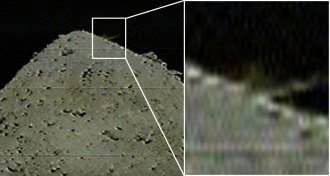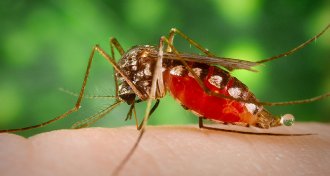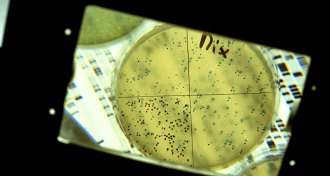All Stories
-
 Neuroscience
NeuroscienceOur brains sculpt each other. So why do we study them in isolation?
Studying individual brains may not be the way to figure out the human mind, a social neuroscientist argues.
-
 Health & Medicine
Health & MedicineA common food additive may make the flu vaccine less effective
A food preservative may impair the ability to fight the flu, a study in mice suggests.
-
 Health & Medicine
Health & MedicineWhen an older person’s brain waves are in sync, memory is boosted
A brain stimulation treatment that nudges older people’s brain waves into sync could lead to noninvasive therapies for dementia and other disorders.
-
 Earth
EarthHow deadly, fast-moving flows of volcanic rock and gas cheat friction
Mixtures of hot volcanic rock and gas called pyroclastic flows travel so far by gliding on air, a new study suggests.
-
 Math
MathMathematicians may have found the fastest way to multiply huge numbers
A new theoretical method for multiplying enormous figures appears to achieve a speed first predicted decades ago.
-
 Science & Society
Science & SocietyThe delight of discovering an asteroid that spits
Editor in Chief Nancy Shute discusses recent news about the asteroid Bennu and Kuiper Belt–object Ultima Thule.
By Nancy Shute -
 Health & Medicine
Health & MedicineReaders seek answers to stories about shingles, Neandertal spears and more
Readers had questions about Neandertal spears, Earth’s inner core and more.
-
 Genetics
GeneticsHere are 5 RNAs that are stepping out of DNA’s shadow
RNAs do a lot more than act as middlemen for protein building. Here are a few of the ways they affect your health and disease.
-
 Paleontology
PaleontologyPeruvian fossils yield a four-legged otterlike whale with hooves
A newly discovered species of ancient whale unearthed in Peru split time between land and sea.
-
 Planetary Science
Planetary ScienceHayabusa2 has blasted the surface of asteroid Ryugu to make a crater
Japan’s Hayabusa2 spacecraft shot a projectile at Ryugu. Next: collecting asteroid dust from the probable impact crater left behind.
-
 Health & Medicine
Health & MedicineTesting mosquito pee could help track the spread of diseases
A new way to monitor the viruses that wild mosquitoes are spreading passes its first outdoor test.
By Susan Milius -
 Life
Life50 years ago, scientists were unlocking the secrets of bacteria-infecting viruses
In 1969, a bacteria-infecting virus held promise for unlocking the secrets of viral replication. Fifty years later, the virus is a versatile tool for scientists.